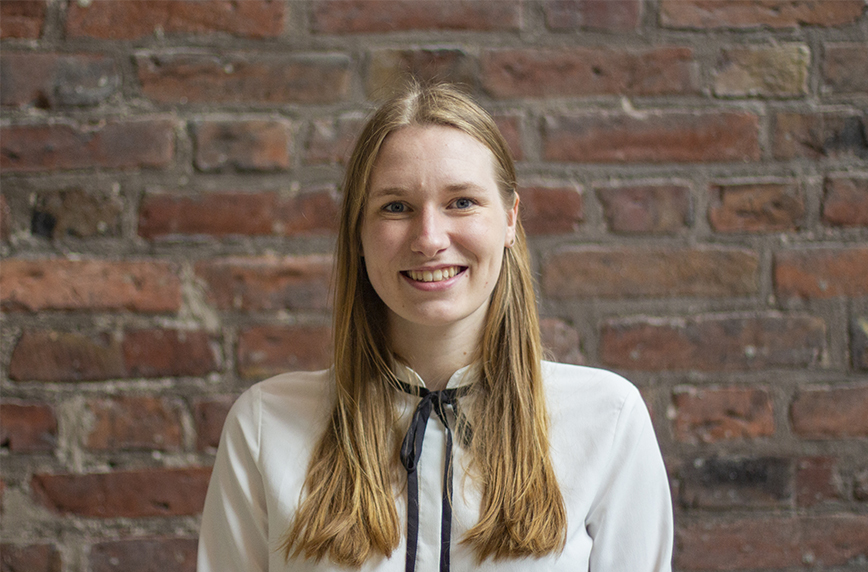As the programme is conducted by three universities in Stockholm, not only do you get insights from all three of them, you also experience all their advantages throughout the entire programme
Linda comes from Germany. She did a bachelor’s in Molecular and Applied Biotechnology at the RWTH University in Aachen. In her free time, she likes to watch TV series, does something creative and takes walks through the city.

Why did you choose this master’s programme?
For my bachelor’s, I studied Biotechnology and I was looking for a programme beyond the scope of pure biotechnology. As I knew I would like to go further into medical biotechnology or technology, this programme offers me the chance to do both. I was also interested in studying in Sweden as I have had good experiences from previous exchange studies in Sweden.
What are the best aspects of your programme?
As the programme is conducted by three universities in Stockholm, not only do you get insights from all three of them, you also experience all their advantages throughout the entire programme. The connection to the Science for Life Laboratory offers great opportunities for internships and networking. I also really enjoy the programming part of the programme as it is completely new to me and an interesting contrast to pure bio-related courses.
What are your favourite courses thus far?
After each course, I was usually very excited about the content presented and considered writing my thesis in those fields. Regarding the first term, my favourite course was Applied Communications. Even though I was very critical before the course started, I enjoyed the course a lot as it was very different from other classes because it focused on how to write and present results in biosciences and discuss bioethical issues. During the second semester at Stockholm University I was really impressed by the excitement of the teachers during the Structure and Dynamics of Biological Membranes course. Even though the topic itself was very specialised, it was really enjoyable to see the enthusiasm of the lecturers about this course.
How do studies at the programme differ from your previous studies?
Besides my bachelor’s not focusing on any programming apart from biotechnology, the whole way of teaching at KTH is very different from my home university. My bachelor’s was mostly based on lectures and student labs during the semester breaks, while this programme incorporates a lot of group work and assignments in order to practically apply the content learned from the lectures. Also, the way exams are designed here differs from the ‘best performance under pressure’ in Germany to the aim of having enough time to perform the best you can in an examination. In addition, the Swedish university system is much less hierarchical than what I was used to, and the teachers are constantly asking for feedback in order to improve next year’s course.
How is student life in Stockholm?
Student life is very much alive on the campuses and in student accommodation areas, although it is less present throughout the rest of the city, which I don’t regard as a disadvantage. I like to be able to disconnect from the university when strolling around the city.
The majority of student life and activities takes place on the campuses and there is a large variety of activities in which you can participate, such as student associations, sports clubs or the chapters and student unions. KTH, KI and SU also offer many opportunities to start networking with the industry at career fairs, etc. The location of Stockholm also gives great opportunities to travel throughout Sweden or take a weekend trip to Tallinn, Riga or Helsinki.
How would you describe your time at the programme so far?
I have gained knowledge of a variety of different fields. The range of lectures, extending from molecular biology to bioinformatics, the way of teaching, methods learned during the courses, as well as experiences from different kinds of group work, have shaped the way I study and prepare for any kind of challenge. Due to the relatively small class size in my year we quickly got to know each other and I made many friends. The opportunity to be part of the study environment of three universities also gave me the chance to make contact with students from all three universities, to exchange knowledge and get a better insight into each of the universities.
What do you want to do after graduating?
I would like to spend some time travelling. I met so many people at KTH from different countries and cultures that I feel the urge to travel to all of these countries and experience them myself. Regarding the long term, I haven’t really decided yet. I am currently considering either doing a PhD or entering the pharmaceutical industry. The Science for Life Laboratory creates so many opportunities to stay in research, which is really attractive to me for doing a PhD in Stockholm. On the other hand, I can also see myself starting a career in the industry as a bioinformatician.
What would you like to say to students thinking of choosing this programme for their master’s studies?
Don’t be afraid of the programming part of the master’s programme. I had no knowledge of programming but could keep up with all classes as the introductory classes start at a basic level. Please feel free to ask me any questions and raise any concerns you might have regarding the programme.
